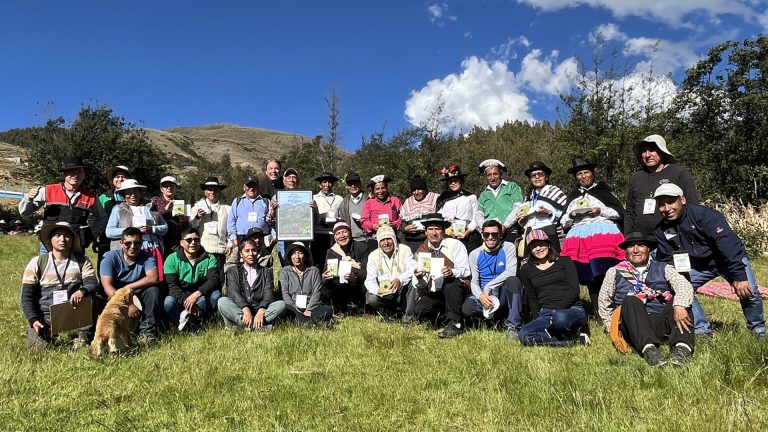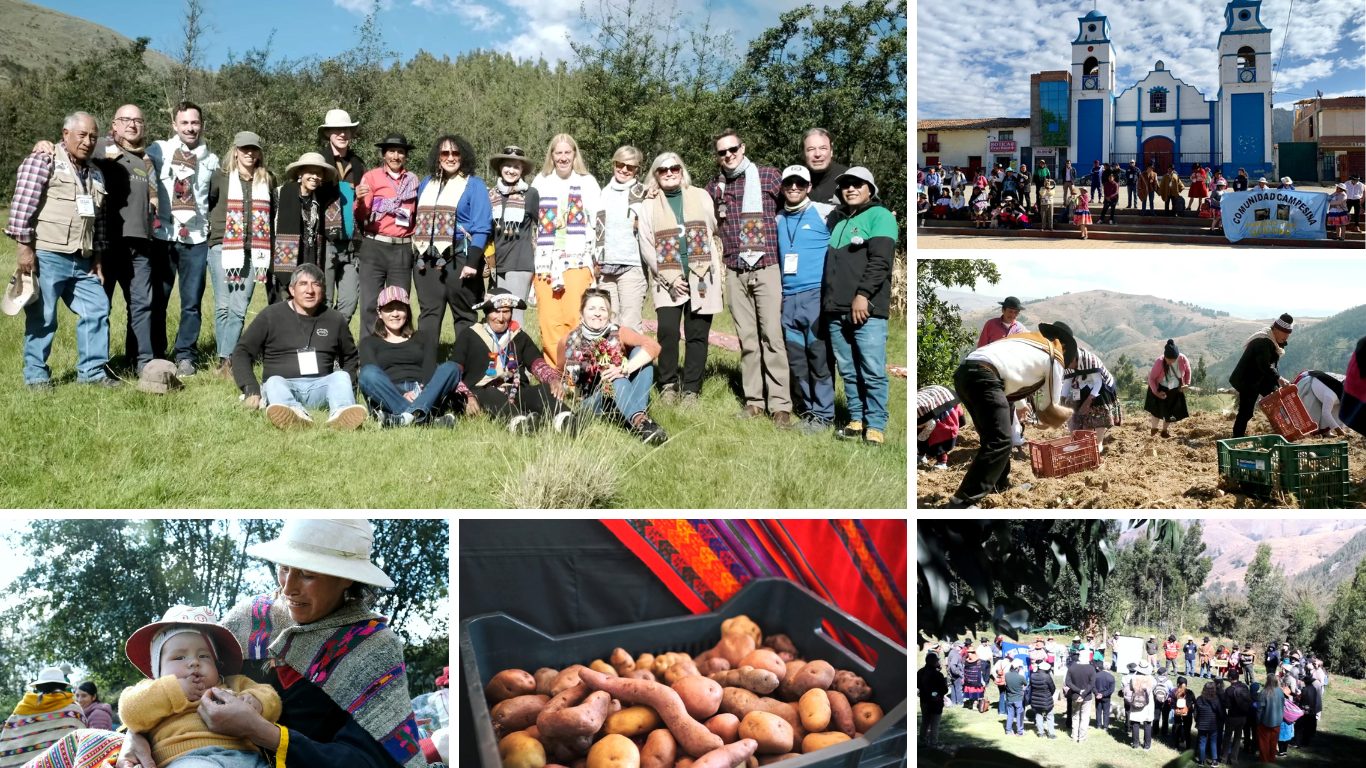
Category:Impact Story10 min read
Category:Impact Story10 min read
Stemming back to long before the Inca Empire, potatoes are a cherished part of Andean heritage. The region is home to more than 4,000 varieties of native potatoes that range in color from cool blues and purples to striking pinks and reds.
“The Mantaro Valley of Peru is an important place, mainly because it’s located in the mountains that we call the Peruvian highlands where small-scale farming is done and where there’s a lot of agriculture based on biodiversity conservation,” explains Katherin Meza, a researcher with Grupo Yanapai, a Peruvian NGO dedicated to supporting those smallholder farmers. “Peru is recognized as the center of origin of the potato, and that makes it a very special place,” she says.
The potato may have a strong origin story in the region–Peru even has a special day to celebrate it each May–but its importance extends across the globe. Behind wheat and rice, the potato is the third most important crop in the world in terms of consumption—more than a billion people consume potatoes. This is one of the reasons why the United Nations declared May 30 International Day of the Potato to recognize the humble tuber as one of humanity’s most important and universally loved staple foods.
Peruvian smallholder farmers have practiced Indigenous farming methods for maintaining and developing their family’s unique collection of native potato seeds for centuries. Through their farming practices, they naturally preserve their seed and potato varieties, but also slowly help evolve them over time. It’s this preservation coupled with evolution that’s critical to biodiversity—and biodiversity is critical to resilience, especially in the face of climate change.
For this reason, Andean potato farmers are more than just farmers. They’re considered potato guardians, each family conserving dozens if not hundreds of potato varieties. If we were to lose their knowledge and expertise, “we would be losing the option to diversify our food system in the future. We would be highly dependent on a few varieties, and that would make us extremely vulnerable to food insecurity,” explains Stef de Haan, the Andean Initiative Coordinator at the International Potato Center (CIP), an international research center focused on Andean potatoes, roots, and tubers.
“So what is happening in the Mantaro Valley is highly relevant, not only for Peru, but for humanity as a whole,” explains Roberto Ugas, McKnight’s Andes Community of Practice Liaison Scientist.
Video filmed by Gonzalo Vera Tudela during 2023 McKnight board and staff visit to Peru, edited by Line Break Media.
The guardians’ efforts have endured, but challenges from both climate change and a globalized food system that has traditionally overlooked the critical contributions of small-scale farmers like Peru’s remain. Overcoming these challenges is why entities like CIP, Grupo Yanapai, and AGUAPAN, an association of potato guardians, have come together to support and sustain smallholder potato farmers.
“Oftentimes it’s been that global imposes itself upon local realities,” explains Jane Maland Cady, program director for McKnight’s Global Collaboration for Resilient Food Systems. The result has been that many of Peru’s smallholder farmers currently live in precarious conditions, often unable to afford healthcare or the ability to send their kids to school.
Instead, support that’s anchored in appreciation for the local is what’s led to helping smallholder farmers support themselves in the ways that they deem important to them, bringing together their knowledge with participatory research so they can continue doing what they do best—safeguarding potatoes and sustaining their family’s livelihood on the land—while being part of collective efforts to grow resilient regional food systems.
During both a week-long annual meetup in addition to other convenings throughout the year, Andean researchers, NGOs, and the farmers themselves come together to share insights, research, concerns, experiences, and their dreams for the future. “We are together with people from different farming communities… [and] different organizations that are trying to support the farmer guardians,” explains de Haan.
“The key outcome of a Community of Practice like this one is that they’re about networking with each other, building relationships, learning from and with each other, and collective action,” Maland Cady says. “The work they’re doing is really an example of how collaboration with others can lead to systems change.”
“McKnight Foundation has been supporting agroecological projects in Ecuador, Peru, and Bolivia for almost 20 years,” explains Roberto Ugas. “For us, the Andean regional team, it’s very important that not only the board of directors, but also the staff with whom we work day by day, know firsthand and directly Peru’s reality, the reality of the Andean countries, and the reality of the people with whom we work.”
“The 20th anniversary of the Andes Community of Practice will be a time for those in attendance to reflect on the powerful story of their collective accomplishments, and celebrate the impact of their work with people and the land,” shared Claire Nicklin, McKnight’s Andes Community of Practice Regional Representative. “Some have been collaborating since its inception, and others for just a couple years.” The gathering will take place June 2-6 in Ayacucho, Peru.
Partnerships like these are gaining momentum around the world, as evidenced by McKnight Foundation’s growing regional and international partners and the tens of thousands of farmers we collaborate with in our communities of practice in 10 countries across the Andes, West Africa, and East and Southern Africa.

“We have the solutions that we need in this world, but we’re ignoring the sources of those solutions,” says Tonya Allen, McKnight’s president. “We have to lift up these amazing local leaders, lift up these issues and the challenges they’re facing, but more importantly, lift up the solutions and aspirations they present. If we’re going to really solve these problems together, we have to be good partners to them.”
It’s sustaining and supportive partnerships that can help AGUAPAN reach its goals. “We want to grow from operations in nine regions currently to every potato-producing region in the country, gaining more active members, and increasing participation among younger generations in the next 10 years,” shares Marcelo Tiza, President of AGUAPAN and potato guardian in the Mantaro Valley.
The potato guardians are not alone in their pursuit of better lives through collaboration, they’re connected to other smallholder farmers and researchers across the globe. In the arid Maradi region of Niger, the Women’s Fields project is testing the efficacy of readily available fertilizers, including human urine, and teaching women in other regions how to do the same, while also spreading the word about climate-resilient millet seedball technology. And in Ecuador and East Africa, farmers are studying how scaling up of agroecology can lead to healthier landscapes for food production–in part by managing crop pests without relying on chemical pesticides.
In each of these examples and many more, smallholder farmers are not only providing nutrition for their families and communities, but improved productivity, improved soil health, and improved livelihoods.
McKnight’s regional communities of practice serve as “living learning labs” for testing, scaling, and spreading these types of solutions. They’re also critical spaces for shifting research norms and agendas and equally valuing local and Indigenous knowledge alongside scientific knowledge. This approach, which requires listening, building trust, and sharing power, is an integral part of McKnight’s efforts to create just food systems, ensuring that more voices decide how outcomes are defined and achieved.
“In our decades of practice,” Maland Cady shares, “we have learned that when local farmers have a say in the health of their food, water, and resources, and share their knowledge, they are a force for global change.”